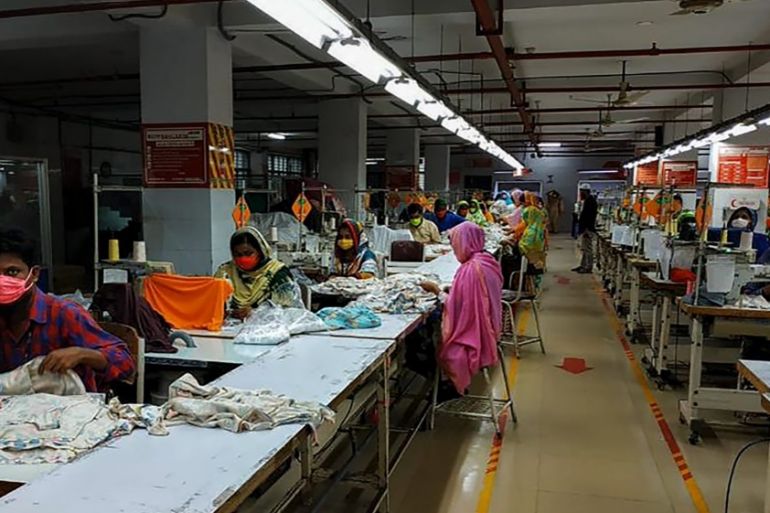Bangladesh garment workers return to work amid lockdown
Thousands of textile workers, desperate for money, resume work at about 1,000 factories that reopened on Monday.

Thousands of textile workers have returned to work in factories in Bangladesh amid a nationwide coronavirus lockdown, raising fears of an increase in the spread of the contagion.
Factories in the capital Dhaka and the port city of Chittagong reopened on Monday after being permitted to resume work. The country’s garment factories had closed in late March but under pressure from retailers to fulfil outstanding export orders, many resumed their operations, despite a nationwide lockdown in place until May 5.
Keep reading
list of 3 itemsRohingya stranded at sea, Bangladesh says not its responsibility
Diaspora offers helping hand as Bangladesh reels from coronavirus
Earlier, Al Jazeera’s Tanvir Chowdhury, reporting from the capital Dhaka, said: “At least 1,000 factories are scheduled to reopen by Monday between Dhaka and other places including the port city of Chittagong.”
Garment forms 80 percent of the South Asian nation’s total annual exports, and the country is expected to lose export revenue of about $6bn this fiscal year as the sector has been hit by cancellations from some of the world’s largest brands and retailers.
“The garment workers are in a precarious situation,” said Chowdhury. “They are worried about the coronavirus and their safety, yet at the same time, they know if they don’t join they will be laid off. They need salaries.”
Mofazzal Hossain, a worker, said he felt compelled to return to his factory, where he earns $115 a month.
“The fear of coronavirus is there,” he told the AFP news agency. “But I am now more worried about losing my job, wages and benefits.”
As of Monday, Bangladesh reported more than 5,900 confirmed coronavirus infections and 152 deaths.
Labour rights activists said they were afraid the return to work could lead to an explosion of COVID-19 cases.
Award-winning activist Kalpona Akter told Al Jazeera that her main concern is the safety of workers.
Coronavirus fears
More than four million people work in thousands of garment factories across Bangladesh, which last year shipped apparel worth $35bn to some of the world’s leading retailers, such as H&M, Inditex and Walmart.
“We have to accept coronavirus as part of life. If we don’t open factories, there will be economic crisis,” said Mohammad Hatem, the vice president of Bangladesh Knitwear Manufacturers and Exporters Association.
|
|
Last month, the government announced a $588m package for the crucial export-oriented sector to pay its workers, but garment manufacturers say funds were not enough to mitigate the crisis.
On Sunday, hundreds of textile workers took to the streets of Dhaka, demanding wage, flouting social distancing norms amid the nationwide lockdown.
Garment workers have held smaller protests in recent weeks to demand wages lost during the crisis.
“For about a week, there have been protests all across the country, workers demanding their back wages, some of the workers haven’t been paid for two months and many are on the brink of starvation,” said Chowdhury.
A nationwide lockdown is in place until May 5, but protesters said they would continue to violate the ban on movement if their demands were not met.
In recent weeks, Bangladesh has sent troops out into the streets to help enforce a shutdown on travel and restrictions on religious gatherings and protests.